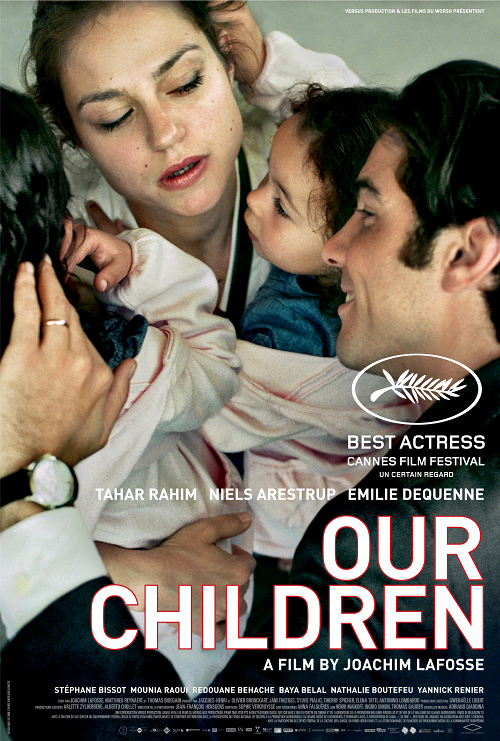
MPAA Rating: NR
Director: Joachim Lafosse
Film Pulse Score: 6/10
Joachim Lafosse’s Our Children features the type of story that has played out in history a million times over – two young people fall in love, completely and wholly infatuated with each other, which leads to marriage and, of course, quickly develops into children and parenthood. An obvious universal theme that lends itself quite well for further emotional and psychological ruminations. However, in Lafosse’s tale (co-written with Thomas Bidegain (Rust and Bone and A Prophet) and Matthieu Reynaert), this universal story of young love, marriage and parenthood is ruminated towards one of the darkest possible outcomes known to parenthood.
The early parts of the film charts the progression of the young love between Mounir (Tahar Rahim) and Murielle (Émilie Dequenne), starting with sex on the beach, exchanging “I love you”‘s, nervously discussing marriage, getting married and then…children. The first pregnancy is met with joy, jubilation and anxious excitement along with the anticipation of a truly unknown, furthermore unparalleled, endeavor of raising a child. The subsequent second pregnancy is met with the same emotions as the first; the third pregnancy…things seem to lose their luster, as Murielle and Mounir evoke a feeling of going through the motions. The fourth, and final, pregnancy is met with anything but the aforementioned emotions. One gets a sense that this is the last thing Murielle and Mounir want – more stress, another mouth to feed, another child to look after…among other things. If all of this is not stressful enough for Murielle, there is the added pressures from Mounir and his adoptive father/guardian Dr. André Pinget (Niels Arestrup).
Mounir is a bit of the freeloading-aimless type, unable to finish much of anything on his own while relying heavily on the generosity of Dr. Pinget, whom has provided Mounir with everything throughout his life. Mounir is want for nothing because of Dr. Pignet; the viewer knows this not only through the interactions on screen, but also through the numerous occasions Dr. Pignet lets it be known to Mounir. Mounir owes everything to André and André does not let him forget it, not even for a moment; Dr. Pignet brandishes guilt with the expertise of a seasoned professional, manipulating and controlling every aspect of not only his life, but that of Mounir and his bride, Murielle. It’s as though Murielle married André when she married Mounir. Unbeknownst to her, Mounir and André are a package deal. Now you have a woman trapped by husband…trapped by back-up husband…trapped by one child, at first, then two…then three…then four.
All of this seems interesting and thought-provoking…as it should – we are dealing with complex human emotions. We are dealing with the dark recesses of the mind in which these emotions reside, developing and mutating into thoughts and actions that seem completely out-of-reach of emotional understanding. Unfortunately, in the hands of Lafosse, these ideas through the his film, Our Children, come across as underdeveloped – mere seedlings of a greater, maybe monumental, work. As it stands on film now, though, Our Children resembles a rough outline of a finished film, in desperate need of careful deliberation and development. Our Children could benefit greatly from the elimination of some of the more extraneous aspects (i.e. the subplot of paper marriages) to development of the overall story to better illustrate the emotional stress in Murielle’s life that drove her to make the decisions that conclude the film.
One positive aspect of Lafosse’s Our Children that is quite remarkable is that of the acting – most notably from Émilie Dequenne, who deserves all of the critical praise and accolades that come her way from her affecting, understated, yet powerful performance, but also the film’s two leads Tahar Rahim and Niels Arestrup. Both actors dominate the film with exquisite chemistry, controlling and manipulating all actions (except a couple) through guilt, judgement and passive-aggression. Dequenne, Rahim and Arestrup, together, are able to take an underdeveloped kernel of a film and turn into something almost worth watching – just imagine what they could have done with a fully realized film.






